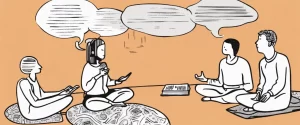
In the vast realm of self-help literature, numerous books have attempted to unravel the mysteries of personal fulfillment and contentment. Among these, two prominent works have risen to the attention of readers seeking insights into the pursuit of happiness: “Let’s Talk” by Art Rios and “You Can Be Happy No Matter What” by Richard Carlson. While both books aim to guide individuals towards a happier existence, they approach this objective through distinct perspectives and methodologies. This comparative study seeks to explore the unique strengths and perspectives presented by Rios and Carlson, examining the divergent ways in which they encourage personal happiness and delve into the complexities of human emotions. By dissecting their underlying philosophies, highlighting their main concepts, and analyzing their distinguishing features, this study endeavors to shed light on the disparate paths towards achieving lasting happiness as depicted in “Let’s Talk” and “You Can Be Happy No Matter What.”
Brief Summary of Two Books
Lets Talk by Art Rios
“Let’s Talk” by Art Rios is a thought-provoking and inspiring book that explores the power of effective communication in our personal and professional lives. This book presents a comprehensive guide to improving your communication skills, enabling you to foster better relationships, enhance mutual understanding, and achieve overall success.
Rios begins by emphasizing the significance of listening with intent and empathy, highlighting the importance of understanding and appreciating differing perspectives. He provides practical techniques to become an active listener, such as focusing on the speaker, asking clarifying questions, and avoiding distractions. By implementing these strategies, readers are encouraged to develop stronger connections, build trust, and reduce conflicts in their interactions.
Furthermore, “Let’s Talk” offers guidance on effective verbal and non-verbal communication. Rios explains the value of choosing words carefully, being mindful of tone and body language, and expressing oneself with authenticity and clarity. Alongside practical exercises and examples, the book offers valuable advice on improving assertiveness, negotiation skills, and conflict resolution.
One essential aspect Rios covers is the communication process in organizations. From improving team collaboration and enhancing leadership to providing constructive feedback and managing difficult conversations, readers gain insights into becoming effective communicators within professional settings.
Additionally, “Let’s Talk” delves into the impact of communication in personal relationships. Rios explores the dynamics of romantic partnerships, friendships, and familial connections, offering guidance on fostering deeper connections, resolving disputes, and creating stronger bonds through open dialogues.
Overall, “Let’s Talk” by Art Rios serves as a comprehensive and practical guide to improving communication skills at all levels of life. By implementing the valuable insights and strategies shared within the book, readers can enhance their relationships, navigate conflicts, and ultimately achieve personal and professional success through the power of effective communication.
You Can Be Happy No Matter What by Richard Carlson
“You Can Be Happy No Matter What” by Richard Carlson is a self-help book that guides readers on how to find lasting happiness and contentment in their lives. The book highlights the misconception that external circumstances determine our happiness and argues that true happiness comes from within, regardless of life’s ups and downs.
Carlson suggests that our thoughts and perceptions greatly influence our emotions and overall well-being. He emphasizes the power of our thoughts in shaping our experiences and encourages readers to challenge their negative thinking patterns. By learning to recognize and dismiss negative thoughts as mere interpretations, readers can foster a more positive mindset and increase their happiness.
The book also delves into the concept of acceptance. Carlson emphasizes the importance of accepting what cannot be changed and focusing on what can be controlled. By accepting the present moment and letting go of the need to control everything, individuals can find a sense of peace and happiness.
Moreover, Carlson shares practical techniques to cultivate happiness, such as gratitude, mindfulness, and meditation. He encourages readers to appreciate the simple joys of life and practice mindfulness to fully experience the present moment. By incorporating these techniques into their daily lives, readers can gradually enhance their overall happiness and well-being.
In essence, “You Can Be Happy No Matter What” offers readers a perspective shift, empowering them to take control of their happiness and find contentment within themselves rather than relying on external circumstances.
Comparison between Two Books

Similarities in Positive Thinking
In both “Lets Talk” by Art Rios and “You Can Be Happy No Matter What” by Richard Carlson, positive thinking is a central theme that is explored in depth. Both authors emphasize the power of our thoughts and how they can shape our outlook on life. Here are some notable similarities between these books regarding positive thinking:
1. Reframing negative thoughts: Both Rios and Carlson highlight the importance of reframing negative thoughts into positive ones. They encourage readers to challenge negative self-talk, question their assumptions, and replace pessimism with optimism. By consciously choosing positive thoughts, individuals can cultivate a more positive mindset and experience greater happiness.
2. Mindfulness and present moment awareness: Both authors argue that being fully present in the moment is instrumental in developing positive thinking. Rios and Carlson emphasize the significance of being aware of our thoughts and emotions, allowing us to consciously choose positive ones. They suggest practices such as meditation, deep breathing, and mindfulness exercises to cultivate present moment awareness.
3. Taking responsibility for thoughts: Both books emphasize that we have control over our thoughts and that we can choose to shape them in a positive way. Rios and Carlson assert that taking responsibility for our own thinking is crucial in creating a positive mindset. They urge readers to become aware of negative thought patterns and actively replace them with positive affirmations and empowering beliefs.
4. Gratitude and appreciation: Another shared theme in these books is the power of gratitude and appreciation. Rios and Carlson advocate for cultivating gratitude as a daily practice to shift focus away from negativity and towards the positives in life. They stress that expressing gratitude can improve overall well-being, increase happiness, and foster positive thinking.
5. The role of self-talk: Both authors address the significance of self-talk in shaping our thinking patterns. Rios and Carlson emphasize the importance of being mindful of the language we use when speaking to ourselves. By adopting positive self-talk, we can build self-esteem, overcome challenges, and develop a more positive mindset.
Overall, “Lets Talk” by Art Rios and “You Can Be Happy No Matter What” by Richard Carlson share several similarities in their approach to positive thinking. Both books highlight the significance of reframing negative thoughts, engaging in present moment awareness, taking responsibility for our thoughts, practicing gratitude, and being mindful of self-talk. By incorporating these principles into our lives, we can cultivate a more positive mindset and experience greater happiness.
Divergences in Positive Thinking
Let’s Talk by Art Rios and You Can Be Happy No Matter What by Richard Carlson are both self-help books that aim to improve lives and foster happiness. While they share some similarities, they exhibit a divergence in their approach to positive thinking.
In Let’s Talk, Art Rios emphasizes the power of positive thinking as essential for personal growth and happiness. He believes that we create our reality with our thoughts, and by consciously choosing positive thoughts, we can transform our lives. Rios provides practical exercises and techniques to help readers shift their mindset, overcome negativity, and cultivate a positive outlook. His book highlights the importance of self-awareness and encourages individuals to take responsibility for their thoughts and emotions.
On the other hand, Richard Carlson’s You Can Be Happy No Matter What presents a slightly different perspective on positive thinking. While he acknowledges the significance of positive thoughts, Carlson focuses more on acceptance and the ability to find contentment in any situation. He suggests that constantly striving for positive thinking can create unnecessary pressure, and instead, advocates for an approach that allows one to be at peace with both positive and negative emotions. Carlson encourages readers to let go of the idea that happiness is solely dependent on external circumstances.
Thus, the divergence in their approach to positive thinking lies in the emphasis. Rios prioritizes conscious positive thinking as a means to transform one’s reality, while Carlson emphasizes acceptance and finding contentment regardless of circumstances. While both authors have the same goal of improving happiness, they offer different paths to achieve it through their unique perspectives on positive thinking.

Conclusion
Both “Lets Talk” by Art Rios and “You Can Be Happy No Matter What” by Richard Carlson are valuable books, but the worthiness of reading depends on individual preferences and needs.
“Let’s Talk” by Art Rios offers insights and strategies for effective communication, emphasizing the importance of healthy conversations and honest dialogue. If you are looking to improve your communication skills, enhance your relationships, or gain a better understanding of how to navigate difficult conversations, this book could be highly beneficial. Rios provides practical techniques and real-life examples to help readers improve their ability to communicate effectively.
On the other hand, “You Can Be Happy No Matter What” by Richard Carlson focuses specifically on achieving happiness and contentment, regardless of external circumstances. Carlson provides a fresh perspective on finding happiness within oneself, emphasizing mindfulness and acceptance. If you are looking for guidance on how to cultivate happiness and overcome challenges, this book could be an excellent choice.
Ultimately, the book that is more worthy of reading depends on your personal goals and interests. If you prioritize enhancing your communication skills, “Let’s Talk” by Art Rios would be a great choice. However, if you are more focused on finding happiness and contentment within yourself, “You Can Be Happy No Matter What” by Richard Carlson would likely be more suitable.



